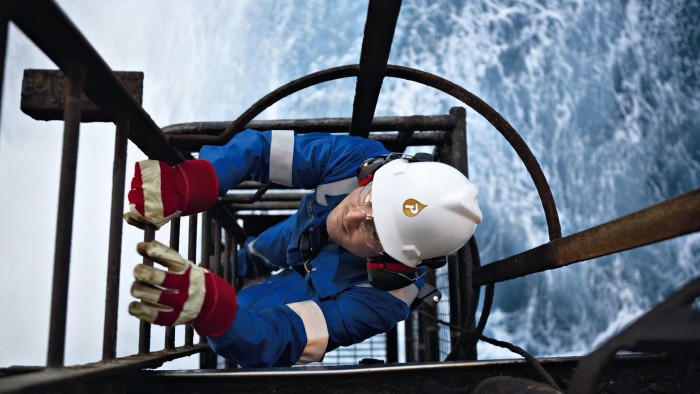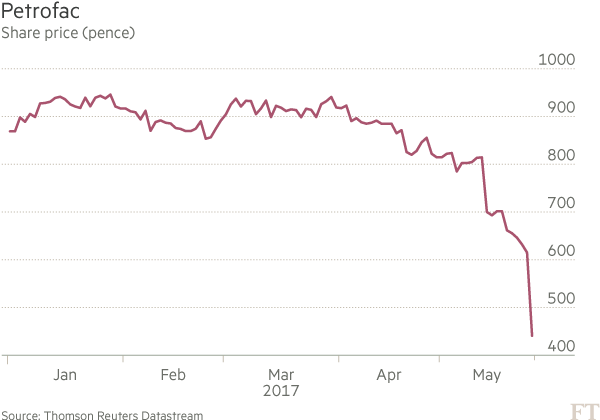Petrofac suspends chief operating officer amid corruption probe

Roula Khalaf, Editor of the FT, selects her favourite stories in this weekly newsletter.
Petrofac has suspended its chief operating officer and barred all contact between its chief executive and external agents, as a criminal probe into suspected bribery, corruption and money laundering deepens.
The UK-listed oilfield services company said on Thursday it had suspended Marwan Chedid, its chief operating officer, who is a potential suspect in the probe by the UK’s Serious Fraud Office.
It added that the SFO had informed Petrofac that it did not consider the company had co-operated with its investigation.
In the event that action is taken against the company, that could reduce the chances of Petrofac gaining a so-called deferred prosecution agreement — a US-style plea deal where a company admits wrongdoing and pays a fine but avoids a criminal prosecution.
The SFO’s probe into Petrofac is linked to its far-reaching criminal investigation into Unaoil, a Monaco-based business.
The Unaoil inquiry was launched by the SFO last year, following a series of reports in the Australian newspaper The Age, which shone a spotlight on the use of consultants by a string of big, international companies seeking to win contracts in areas such as the Middle East.
Petrofac revealed this month that its chief executive, Ayman Asfari, and Mr Chedid had both been interviewed under caution by the SFO but were later released without charge. Such questioning — when an individual is cautioned about his or her right to silence — is distinct from witness interviews, and signals that investigators consider the individual a potential suspect in a criminal probe.
In an update on Thursday, the company said it had suspended Mr Chedid “until further notice” and he had, as a consequence, resigned from the board.
Petrofac’s share price slumped by almost 30 per cent to 438p — its lowest level since the financial crisis in 2009.

Mr Asfari will remain in his post but Petrofac has set up a separate board-level committee to manage the company’s response to the SFO investigation. This will be overseen by a senior external specialist, who has yet to be appointed.
Mr Asfari, who is Petrofac’s biggest shareholder, with an 18.2 per cent stake, will not be involved in “any matters connected to the investigation, and will have no role or responsibilities for engaging with or liaising with agents and consultants”, the company said in a statement.
However it added that its actions “do not in any way seek to prejudge the outcome of the SFO’s investigation”.
Petrofac’s chairman, Rijnhard van Tets, said: “These decisions signal the board’s determination to co-operate fully with the SFO and its investigation, whilst ensuring Petrofac continues to deliver for its clients.”
The company’s share price has fallen sharply since May 12, when the company revealed its chief executive and chief operating officer had been interviewed under caution.
Analysts have warned that the SFO investigation comes in a critical year for Petrofac, which needs to win contracts. Analysts at Cenkos said: “This is beginning to look very serious, indeed.”
Petrofac has disclosed that it engaged Unaoil to provide local consultancy services, primarily in Kazakhstan between 2002 and 2009, although it was linked by The Age to the Monaco-based business in relation to securing contracts in other countries such as Syria.
Last year Petrofac commissioned an independent review of its past ties to Unaoil, which was carried out by Freshfields Bruckhaus Deringer, the law firm, with the support of forensic accountants at KPMG. In August last year, Petrofac said that review “did not find evidence confirming the payment of bribes”.
However, Petrofac said on Thursday that the SFO “does not accept” the findings of that investigation and “does not consider the company to have co-operated with [the SFO]”.
Petrofac added on Thursday: “It is for the SFO to determine the outcome of its investigation and any prosecutions in due course. The company is committed to co-operating with the SFO's investigation. The company is devoting very significant resources in its current engagement with the SFO.”
One legal expert said the SFO’s determination that Petrofac had not co-operated was “unhelpful, as far as securing a DPA is concerned”.
The SFO has previously stressed that DPAs are only for companies that co-operate.
The agency’s sprawling probe into Unaoil has led to it opening investigations into a number of other companies, including the UK units of Swiss engineering company ABB and the UK subsidiaries of KBR, the New York-listed engineering and construction company that was once part of US oilfield services giant Halliburton.
British oilfield services company Wood Group revealed this week that it was conducting an internal investigation into its past dealings with Unaoil. Amec Foster Wheeler, another London-listed services company that Wood Group has agreed to buy, has also been requested by the SFO to provide information in relation to its Unaoil probe.
Unaoil has called allegations made in the media against it “malicious and damaging”.
Comments